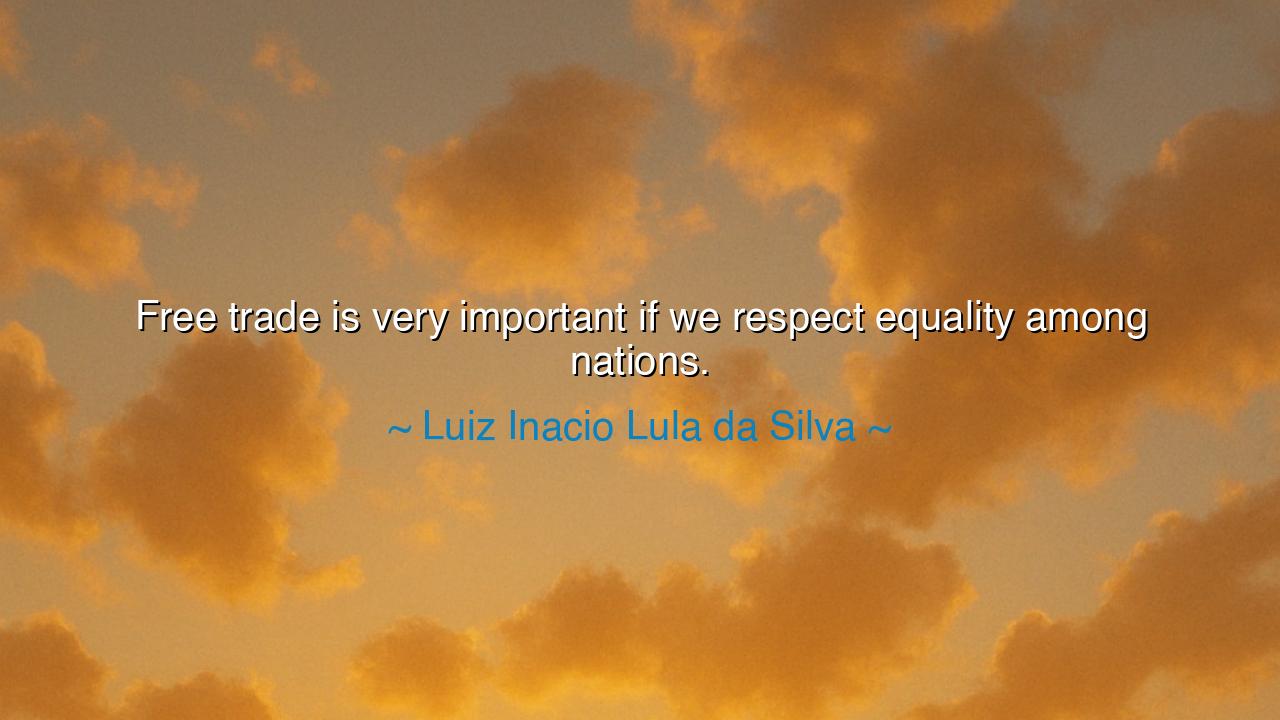
Free trade is very important if we respect equality among






When Luiz Inácio Lula da Silva declared, “Free trade is very important if we respect equality among nations,” he spoke not only as a president, but as one forged in the struggles of the common worker. His words rise with the weight of justice, calling the world to remember that commerce, stripped of fairness, becomes tyranny, and that trade, if it is not guided by equality, binds weaker nations in chains rather than lifting them into prosperity. In his voice, one hears the cry of those whose labor built wealth for others while leaving their own tables bare.
The meaning of this quote lies in its moral foundation. Free trade, when practiced honorably, opens markets, creates opportunity, and draws nations into cooperation. Yet freedom without fairness is but another mask for domination. If stronger nations use trade to exploit, to dictate terms, or to plunder resources, then there is no equality—only a new form of conquest. Lula insists that true trade must be rooted in respect, where each nation, rich or poor, stands as a partner rather than a servant.
The origin of these words comes from Lula’s own journey. Born into poverty in Brazil, he worked as a metalworker before rising as a union leader and eventually as president. He knew firsthand how the global economy could trap nations like his in cycles of dependency—exporting raw goods at low prices while importing finished products at great cost. In advocating for free trade with equality, he was not rejecting the global market, but demanding that it be just—that developing nations should not be left to struggle while the powerful grew fat from their labor.
History offers us the story of the Silk Road, that ancient network of trade that linked East and West. At its best, it was not conquest, but exchange—spices for silver, silk for horses, knowledge for knowledge. Great civilizations flourished because trade was mutual, not exploitative. But when trade routes became tools of domination, when empires demanded tribute instead of fair exchange, they sowed resentment and rebellion. The Silk Road teaches us, as Lula reminds, that trade without equality cannot endure; only balance preserves peace.
The wisdom of Lula’s words is that economics cannot be divorced from morality. Too often, nations speak of markets as if they are forces of nature, beyond good and evil. Yet trade is human, shaped by choice and policy, and must therefore answer to justice. To speak of free trade without speaking of equality is to ignore the lives of millions whose labor sustains it. A just global order cannot be built on contracts that enrich the few while impoverishing the many.
The lesson for us is clear: whether as nations or as individuals, we must demand fairness in exchange. Let no agreement be written that lifts one partner while crushing another. Let no bargain be struck that robs dignity from the weaker voice. For equality in trade is not charity—it is justice. When all nations prosper together, peace grows strong; when some are exploited, conflict becomes inevitable.
What then must the listener do? Support policies and leaders who seek fair trade, not exploitation. As consumers, choose with conscience, remembering that behind every product stands a worker, a family, a nation. As citizens, raise your voice against injustice in commerce, whether local or global. Strive always to ensure that freedom and equality walk hand in hand, in markets as in life.
Remember always: free trade is very important—but only if it honors equality among nations. This is the truth Lula da Silva offers: that trade is not merely an exchange of goods, but a covenant between peoples. If it is built on respect, it strengthens the world; if it is built on domination, it tears the world apart. Pass down this wisdom, and let future generations build markets not of greed, but of justice.






AAdministratorAdministrator
Welcome, honored guests. Please leave a comment, we will respond soon